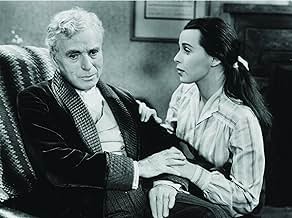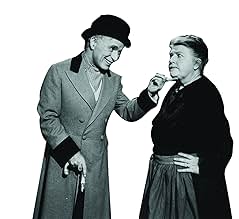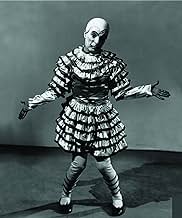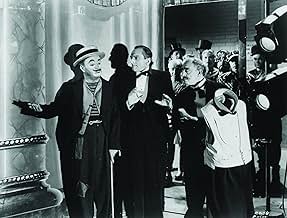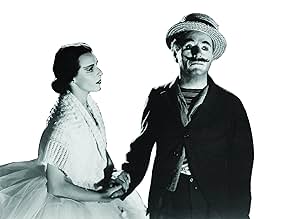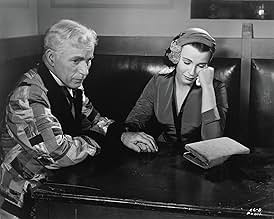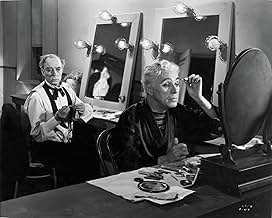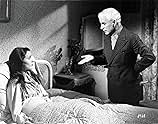AVALIAÇÃO DA IMDb
8,0/10
23 mil
SUA AVALIAÇÃO
Um comediante em desvanecimento e uma dançarina de balé suicida e desanimada devem olhar um para o outro para encontrar um propósito e esperança em suas vidas.Um comediante em desvanecimento e uma dançarina de balé suicida e desanimada devem olhar um para o outro para encontrar um propósito e esperança em suas vidas.Um comediante em desvanecimento e uma dançarina de balé suicida e desanimada devem olhar um para o outro para encontrar um propósito e esperança em suas vidas.
- Ganhou 1 Oscar
- 7 vitórias e 4 indicações no total
Molly Glessing
- Maid
- (as Mollie Glessing)
Leonard Mudie
- Dr. Blake - Calvero's Doctor
- (as Leonard Mudi)
'Snub' Pollard
- Street Musician
- (as Snub Pollard)
Billy Lee Aimone
- Little Boy
- (não creditado)
Avaliações em destaque
Charles Chaplin stars as Calvero, an alcoholic, washed-up music hall comedian who saves a rooming house neighbor from committing suicide when he passes by her door and smells gas. The neighbor, young ballet dancer Thereza (Claire Bloom), attempted suicide because she believes that she will never walk and therefore never dance again. She stays with Calvero while she recuperates, and the old comic starts to improve himself as he sets out to get Thereza the chance to prove herself as a world-class dancer. Thereza wants to marry Calvero in spite of their large age difference (I won't go into how art is imitating life here), but he feels that a young composer (Sydney Earl Chaplin) would be a better match. Complications ensue.
Chaplin's last starring role came in this bittersweet drama, a massive hit everywhere else in the world, but barely released in the U. S. due to Chaplin being labeled a "dangerous leftist". I had the same opinion of this that I did with many of his silent movies: it's technically proficient, but the sentimentality is a bit too thick, and it often seems blatantly phony, and not earned by what has been shown on screen. I've grown to like many of Chaplin's films on repeat viewings, and even love a couple of them, but I've always preferred the work of Buster Keaton. It was nice seeing the two on screen together, but it wasn't for long enough. The movie eventually received an Oscar-qualifying premiere in L. A. twenty years later, and thus bizarrely won the 1972 Oscar for Best Score (Charles Chaplin, Ray Rasch, and Larry Russell).
Chaplin's last starring role came in this bittersweet drama, a massive hit everywhere else in the world, but barely released in the U. S. due to Chaplin being labeled a "dangerous leftist". I had the same opinion of this that I did with many of his silent movies: it's technically proficient, but the sentimentality is a bit too thick, and it often seems blatantly phony, and not earned by what has been shown on screen. I've grown to like many of Chaplin's films on repeat viewings, and even love a couple of them, but I've always preferred the work of Buster Keaton. It was nice seeing the two on screen together, but it wasn't for long enough. The movie eventually received an Oscar-qualifying premiere in L. A. twenty years later, and thus bizarrely won the 1972 Oscar for Best Score (Charles Chaplin, Ray Rasch, and Larry Russell).
Most ordinary people fall into a role and a persona in their lives, and tend to not veer very far from it if it provides for them. Perhaps, due to extreme situations, they may find it necessary to reinvent themselves once or twice and rise to the occasion or fall into dissolution.
An artist like Chaplain had to reinvent himself over and over again over four decades, particularly in a medium that was changing every few years. That's probably why he had so many failed marriages with younger woman; he had to feel like a "player" to keep the flow going and fight back the doubt and anxiety (and the terror of becoming irrelevant) that inevitably begins to haunt creative men in their twilight years. Don't underestimate the power of sex magic!
Limelight is a film about those demons, and the immense courage (and yes, the love of a much younger woman, too, doesn't hurt), that is required to triumph over them. Still, everyone knows there is one specter that no man can outrun -- Death. Chaplain masks this existential dimension in layers of sentimental melodrama which you will have to decide for yourself is effective, but I think he does this intentionally to smuggle in some deep and darker themes that filmmakers like Bergman would become famous for continually exploring masterfully.
I found myself going back and forth with Limelight; there are times when the melodrama overpowers the film, and the pedestrian cinematography doesn't help matters. A few times I felt like I was watching the old Abbot and Costello TV show, particularly the apartment scenes. However, Chaplain is such an immense presence you can't help be engaged and encouraged to keep watching because you want so much for his character Calvero to triumph. His co-star, Claire Bloom, is quite effective, too, and she has several "looks" in this film to contrast and mirror the ongoing struggle the old comedian in having internally.
Getting on in years myself, and feeling washed up and without hope and purpose, Calvero's plight and faltering desire to once again command the Limelight was quite cathartic. I was amazed by his final performance with Keaton; when Calvero starts rocking that violin like Eddie Van Halen in his prime, I was in a state of sublime fascination. Here was a true artist giving everything up for his audience, feeling the peak thrill of having the audience at his command once again for a few fleeting moments; a thrill that, tragically, he will pay dearly for.
We can only hope that we, too, can earn such an exalted death as Calvero's. Perhaps that is Chaplain's hidden message in this film; that life is, in the final analysis, about striving for a death that ennobles those you leave behind.
An artist like Chaplain had to reinvent himself over and over again over four decades, particularly in a medium that was changing every few years. That's probably why he had so many failed marriages with younger woman; he had to feel like a "player" to keep the flow going and fight back the doubt and anxiety (and the terror of becoming irrelevant) that inevitably begins to haunt creative men in their twilight years. Don't underestimate the power of sex magic!
Limelight is a film about those demons, and the immense courage (and yes, the love of a much younger woman, too, doesn't hurt), that is required to triumph over them. Still, everyone knows there is one specter that no man can outrun -- Death. Chaplain masks this existential dimension in layers of sentimental melodrama which you will have to decide for yourself is effective, but I think he does this intentionally to smuggle in some deep and darker themes that filmmakers like Bergman would become famous for continually exploring masterfully.
I found myself going back and forth with Limelight; there are times when the melodrama overpowers the film, and the pedestrian cinematography doesn't help matters. A few times I felt like I was watching the old Abbot and Costello TV show, particularly the apartment scenes. However, Chaplain is such an immense presence you can't help be engaged and encouraged to keep watching because you want so much for his character Calvero to triumph. His co-star, Claire Bloom, is quite effective, too, and she has several "looks" in this film to contrast and mirror the ongoing struggle the old comedian in having internally.
Getting on in years myself, and feeling washed up and without hope and purpose, Calvero's plight and faltering desire to once again command the Limelight was quite cathartic. I was amazed by his final performance with Keaton; when Calvero starts rocking that violin like Eddie Van Halen in his prime, I was in a state of sublime fascination. Here was a true artist giving everything up for his audience, feeling the peak thrill of having the audience at his command once again for a few fleeting moments; a thrill that, tragically, he will pay dearly for.
We can only hope that we, too, can earn such an exalted death as Calvero's. Perhaps that is Chaplain's hidden message in this film; that life is, in the final analysis, about striving for a death that ennobles those you leave behind.
Charlie Chaplin is one of the undisputed masters of the cinema. He was one of the funniest actors of the cinema, and he was also one of the greatest directors. Of course, the films that he is most famous for are his silent comedies, especially The Gold Rush, City Lights, and Modern Times. The latter two were the product of Chaplin's stubborn clinging to the format and conventions of the silent cinema, though everyone else had gone to sound. This stubbornness was certainly sound. His contemporaries such as Buster Keaton and Harold Lloyd lost popularity when they moved to sound. Chaplin's last two silent films were popular and made a lot of money. Audiences may have craved sound, but they craved Chaplin, too, and did not disdain his silence. He was one of the silent artists who thought that they were just achieving the peak of their medium when sound came in. He proved himself right, since City Lights (1931) and Modern Times (1936) are probably his two best films, and both are two of the best films ever made.
Finally, in 1940, Chaplin directed and starred in his first talkie, The Great Dictator. Three more followed, Monsieur Verdoux, then Limelight, then King of New York, which happens to be the only one of these four I have not seen. The Great Dictator and Monsieur Verdoux were both good films in their own way, but perhaps Chaplin's in depth political commentary in these films detracted from them. The type of comedy that you find in his silent films did not mix well with this social commentary. The simple juxtapositions of the worlds of the poor and the rich in City Lights and Modern Times were far more powerful than what his first two talkies had to offer.
Then came Limelight, one of the most bittersweet films ever made. It is not perfect, but it achieves a grand melodramatic beauty that few films have ever even approached. The story is simple: a washed-up, old vaudvillian rescues a young ballet dancer from suicide. He takes care of her until she is healthy again, and even restores her confidence. The story may be simple, but the character dynamics are very complex. As the dancer, Theresa, is recovering, Calvero is not only rebuilding her confidence, but also his own. Theresa, because of his kindness towards her, finally believes she has fallen in love with him, even going so far as proposing marriage to him. Whether she actually loves him or not, and Calvero strongly asserts that she shouldn't and doesn't, these two characters have a constantly evolving relationship that does not end until the credits role. It is utterly fascinating, captivating, and dramatic.
There are a couple of problems, and though they're small, they deserve attention. Perhaps the biggest problem is that Claire Bloom is quite guilty of overacting. Her line delivery is bizarre and overdramatic. This isn't a big deal, since you ought to be keenly aware that the film takes place in the world of melodrama, and is thus exaggerated. Another thing that irked me is Buster Keaton's role. It is little more than a cameo. In fact, his character doesn't even have a name in the credits. This is truly disappointing, seeing that he, although Chaplin may have had the most heart, was the all-around funniest silent comedian.
Finally, in 1940, Chaplin directed and starred in his first talkie, The Great Dictator. Three more followed, Monsieur Verdoux, then Limelight, then King of New York, which happens to be the only one of these four I have not seen. The Great Dictator and Monsieur Verdoux were both good films in their own way, but perhaps Chaplin's in depth political commentary in these films detracted from them. The type of comedy that you find in his silent films did not mix well with this social commentary. The simple juxtapositions of the worlds of the poor and the rich in City Lights and Modern Times were far more powerful than what his first two talkies had to offer.
Then came Limelight, one of the most bittersweet films ever made. It is not perfect, but it achieves a grand melodramatic beauty that few films have ever even approached. The story is simple: a washed-up, old vaudvillian rescues a young ballet dancer from suicide. He takes care of her until she is healthy again, and even restores her confidence. The story may be simple, but the character dynamics are very complex. As the dancer, Theresa, is recovering, Calvero is not only rebuilding her confidence, but also his own. Theresa, because of his kindness towards her, finally believes she has fallen in love with him, even going so far as proposing marriage to him. Whether she actually loves him or not, and Calvero strongly asserts that she shouldn't and doesn't, these two characters have a constantly evolving relationship that does not end until the credits role. It is utterly fascinating, captivating, and dramatic.
There are a couple of problems, and though they're small, they deserve attention. Perhaps the biggest problem is that Claire Bloom is quite guilty of overacting. Her line delivery is bizarre and overdramatic. This isn't a big deal, since you ought to be keenly aware that the film takes place in the world of melodrama, and is thus exaggerated. Another thing that irked me is Buster Keaton's role. It is little more than a cameo. In fact, his character doesn't even have a name in the credits. This is truly disappointing, seeing that he, although Chaplin may have had the most heart, was the all-around funniest silent comedian.
Charles Chaplin plays Calvero, an aging clown who rescues a ballet dancer called Terry (Claire Bloom) from committing suicide.These two become friends and Calvero gets more meaning to his life.He desperately tries to make a come back to become the greatest clown again but it's hard to make people laugh anymore.Limelight from 1952 was Charles Chaplin's last American film.It was a flop but the film won an Academy Award for best score in 1972.That year the king of comedy got also a special Oscar for career achievement.This was Chaplin's most sentimental movie and it also was very touching.Chaplin is amazing as the aging clown.The man wasn't only a great comedian.He was also a terrific actor.It's hard to top his performance in this movie.Claire Bloom's performance as the ballet dancer is also brilliant.Chaplin's son Sydney plays Neville in the movie.There are also Chaplin's children Victoria, Michael, Josephine, Geraldine and Charles Chaplin Jr. in this film.This is truly a masterpiece.This proves that Chaplin didn't shine only in silent movies.He did that also in talkies.And this is one of his best talkies. The dialogue is just delicious in this comedic drama.In the end you can see another great comedian from the silent era;Buster Keaton.You can see Chaplin and Keaton clowning together in the end.And that is one great scene.A scene to remember.The message of Limelight is how wonderful life is.Enjoy it while you still can.
Haunting and unforgettable piece from Charles Chaplin that was nearly lost in the American cinema all together. It played in very few cities within the U.S. in 1952 and was never shown in Los Angeles due to the suspicion that the House of Un-American Acts Committee had concerning Chaplin (making no sense to me as Chaplin, who was British, was the polar opposite of a Communist from all indications). The film disappeared from U.S. soil and did not re-surface until some 20 years later in 1972 and Chaplin actually won an Oscar, with fellow scorers Raymond Rasch and Larry Russell, for this movie's original dramatic score (this was the only competitive Oscar Chaplin ever won). Chaplin stars as a washed-up vaudeville performer. He is now an elderly man (in his 60s when the film was made) and the spotlight is gone forever, even though he still secretly yearns for it. Chaplin discovers a very young ballet dancer (Claire Bloom) who has attempted suicide because she cannot handle being a performer. Naturally Chaplin cannot believe that this young, beautiful and talented woman would rather take her life than be a ballet performer (the fact that Chaplin yearns for her youth and the ability to be an entertainer again makes him bound and determined to get her back on her feet). He tries with all his might to get her performance-ready again, all the while he is also trying to resurrect the career that he lost long ago. Chaplin has a dream of a stunning performance he has on the stage, but when his act ends there is no one there to acknowledge him (one of, if not the saddest sequences I have ever seen on film). Soon it becomes obvious that Chaplin's time is running out and his desperation to have that one last piece of action engulfs his mind, body, heart and soul. "Limelight" is one of the most dramatic and intense pictures I have ever encountered. Chaplin's life and career had changed dramatically by 1952. The Little Tramp was no more, all movies had sound, some films were being made in color and the subject matter of motion pictures was slowly starting to change. In many ways Chaplin was trying to show the viewing public his life in celluloid form and "Limelight" would be the vehicle used. This is a stunning work that once again shows the humanity and overall sensitivity that Chaplin had with his movies. Chaplin's long-time rival in real-life (Buster Keaton) even shows up late and acts as a partner in the duo's stage routine. The pairing is usually the most memorable part of this production to most, but the story and the deep emotional part that Chaplin plays are the things that make "Limelight" quite possibly Chaplin's greatest cinematic masterpiece. 5 stars out of 5.
Você sabia?
- CuriosidadesThe Academy Award that Sir Charles Chaplin won for composing this film's score is the only competitive Oscar he ever received; his other awards were given to him for special achievement outside of the established categories.
- Erros de gravaçãoIn discussing the ballet with the cast, the dance director Bodalink casts a giant shadow in front of the auditorium seats (revealing it to be nothing more than a backdrop).
- Cenas durante ou pós-créditos"The glamour of limelight, from which age must pass as youth enters."
- Versões alternativasThe version of the film that premiered in London in 1952 ran 141 minutes. It had been in distribution for several months, when Charles Chaplin recalled film prints and deleted a scene in which Calvero leaves the sleeping Thereza, and goes to a bar, where he meets his old friend Claudius, the arm-less violin player, who gives Calvero money. The film ran 137 minutes after this scene was edited out for worldwide distribution. In the ending credits, there is still a billing for Stapleton Kent as Claudius, even though he is no longer seen in the film. The DVD includes the deleted scene as an extra feature.
- ConexõesEdited into Histoire(s) du cinéma: Une histoire seule (1989)
Principais escolhas
Faça login para avaliar e ver a lista de recomendações personalizadas
- How long is Limelight?Fornecido pela Alexa
Detalhes
- Data de lançamento
- País de origem
- Centrais de atendimento oficiais
- Idioma
- Também conhecido como
- Candilejas
- Locações de filme
- Empresa de produção
- Consulte mais créditos da empresa na IMDbPro
Bilheteria
- Faturamento bruto mundial
- US$ 9.291
- Tempo de duração
- 2 h 17 min(137 min)
- Cor
- Proporção
- 1.37 : 1
Contribua para esta página
Sugerir uma alteração ou adicionar conteúdo ausente


